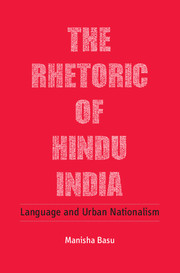Book contents
- Frontmatter
- Dedication
- Contents
- Preface
- 1 Introductory Matters: The Strange Case of Secular India
- 2 Time's Victims in a Second Republic: New Histories, New Temporalities
- 3 To Make Free and Let Die: The Economics of Metropolitan Hindutva
- 4 A Power over Life and Rebirth: V. D. Savarkar and the Essentials of Hindutva
- 5 Between Death and Redemption: Hindu India and its Antique Others
- 6 The After-Life of Indian Writing in English: Telematic Managers, Journalistic Mantras
- Bibliography
- Index
5 - Between Death and Redemption: Hindu India and its Antique Others
Published online by Cambridge University Press: 23 July 2017
- Frontmatter
- Dedication
- Contents
- Preface
- 1 Introductory Matters: The Strange Case of Secular India
- 2 Time's Victims in a Second Republic: New Histories, New Temporalities
- 3 To Make Free and Let Die: The Economics of Metropolitan Hindutva
- 4 A Power over Life and Rebirth: V. D. Savarkar and the Essentials of Hindutva
- 5 Between Death and Redemption: Hindu India and its Antique Others
- 6 The After-Life of Indian Writing in English: Telematic Managers, Journalistic Mantras
- Bibliography
- Index
Summary
I argued in the previous chapter that despite the convergences between them, there is no doubt a gap between the discourse of Hindutva as it emerged through the work of Vinayak Damodar Savarkar in the 1920s and the same ideology as it has manifested in the Indian context of the late twentieth century. In the earlier version of Hindu nationalism, the callow beginnings of regulatory mechanisms of power that have as their object a massified domain of biological life are still intimately linked to disciplinary technologies of power centering on the individual human subject. In the Hindutva of the 1980s and 90s however, power increasingly has as its object not the individual Hindu soul in its differential relations to an ‘other’, but an exclusively Hinduized mass of species life that is bio-politically guaranteed, protected and insured against all contaminating deviations. This gap between the two iterations of Hindutva, is inflected, as I will demonstrate in this chapter, by yet another difference that has to do with the separable signifying practices whereby the interdependent but still autonomous discourses of 1920's Hindutva and new age Hindutva come into being. In remarking this point of distinction in relation to the matter of the two models of power associated with the earlier and later instances of Hindu nationalism, I hope to draw attention to the counterpoint between imaginations of power on one hand and the specifics of style and the politics of language on the other.
I indicated in the previous chapter that the style of Vinayak Damodar Savarkar's writings is in a differential relation of proximity to the signifying practices of a contemporary ideologue of Hindutva like Jay Dubashi, for instance. While this is no doubt true in a variety of different ways for almost all of Savarkar's work, it is important to note that in writing the text for which he would be most reviled as well as memorialized – his 1922 pamphlet The Essentials of Hindutva – Savarkar chose English, or at least a kind of early Indo-Anglian idiom, rather than the regional vernacular Marathi.
- Type
- Chapter
- Information
- The Rhetoric of Hindu IndiaLanguage and Urban Nationalism, pp. 133 - 165Publisher: Cambridge University PressPrint publication year: 2016



